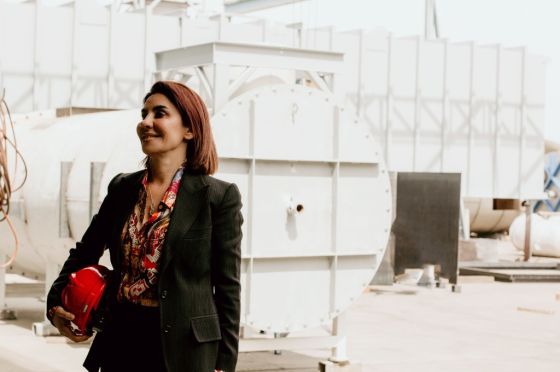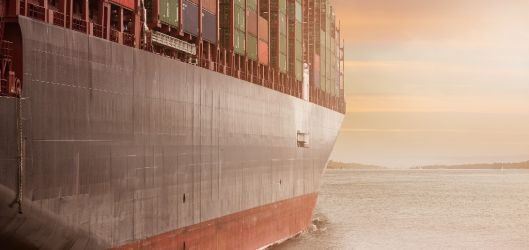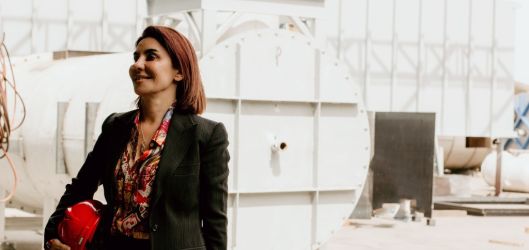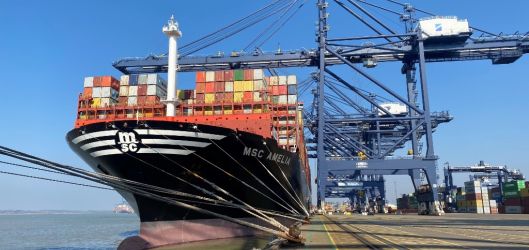
Working in the environmental engineering industry is a source of pride for Anoosheh Oskouian, President and CEO of Ship & Shore Environmental, Inc. She explains why entering STEM fields is important for women and how the fastener industry can improve its environmental credentials in this Women in Fasteners interview.
How did you get into the industry?
It began with my interest in the disciplines of science, technology, engineering, and mathematics (STEM) as a young girl. I was eager to learn about how things worked, so naturally, I was drawn to formulas that revealed to me that there are solutions to all equations and problems.
It is not always easy for girls to enter the fields of STEM, but it is crucial for our society's progress and advancement.
I am grateful that I also had supportive parents, teachers, and mentors who encouraged me to pursue my interest in this field. This enabled me to defy the norms we saw back then, and still see today. Their encouragement made it possible for me to leave my home country of Iran at a young age to study in the US, where I eventually received my bachelors in chemical engineering from the University of Colorado.
What does your day-to-day job involve?
As the President and CEO of an environmental engineering company, I have a significant responsibility to lead and manage my organisation to achieve its goals and objectives. My day-to-day responsibilities involve a wide range of activities that are critical to the success of the company. I oversee all departments including engineering and project teams, sales and marketing, and our overall operations. I communicate directly with many of our clients and stakeholders, as well as conduct site visits and assessments.
As the leader of this company, I am responsible for building and managing a high-performing team. This includes recruiting and retaining top talent, providing regular feedback and performance evaluations, and fostering a positive and productive work environment. It is very important to me to be able to provide opportunities for professional development and growth, while also ensuring that my employees are motivated and engaged.
As a CEO, I am responsible for managing the financial health of this company. This includes developing and monitoring budgets, forecasting revenue and expenses, and making strategic decisions to ensure the long-term viability of the company.
Finally, as the leader of an environmental engineering company, I have a unique responsibility to be a steward of the environment. This means ensuring that the company operates in a sustainable and responsible manner, reducing its environmental footprint and minimising negative impacts on the natural world.
Tell us more about Ship & Shore Environmental Inc?
Ship & Shore Environmental, Inc. is a Long Beach, California-based, woman-owned, certified company specialising in air pollution capture and control systems for industrial applications. Ship & Shore helps major manufacturers meet Volatile Organic Compound (VOC) abatement challenges by providing customised, energy efficient air pollution abatement systems for various industries, resulting in improved operational efficiency and tailored "green" solutions.
Since 2000, Ship & Shore has been prepared to handle and advise on the full spectrum of environmental needs with its complete array of engineering and manufacturing capabilities and global offices around the U.S., Canada, Europe, India, and China. The Ship & Shore Technical Engineering Team has custom designed tailored solutions for clients throughout the world.
How can Ship & Shore Environmental Inc help those in the fastener industry?
As an environmental engineering company that specialises in Regenerative Thermal Oxidizers (RTOs) as well as various other custom and highly innovative air pollution control systems, our expertise can be of significant benefit to those in the fastener industry. Fastener manufacturing processes often release emissions, such as volatile organic compounds (VOCs), into the air. These emissions can be harmful to human health and the environment.
RTOs can effectively remove these emissions by using a high-temperature process to combust the pollutants and convert them into harmless by-products such as water and carbon dioxide. This not only helps to protect the environment but also enables the fastener industry to comply with local and national emissions regulations. We can provide customised RTO solutions to meet the specific needs and requirements of each fastener manufacturer, helping them to reduce their environmental impact and improve their overall sustainability.
Sustainability has arguably been focused more on fastener wholesalers/importers rather than fastener manufacturers, but Ship & Shore can help at that manufacturer/producer level?
We have the potential to greatly benefit those in the fastener industry, including levelling out the focus on sustainability between manufacturers/producers of fasteners, as opposed to wholesalers/importers.
With our expertise in designing and installing RTOs, our customised solutions meet fastener manufacturers specific needs, helping them to improve their environmental performance, reduce operational costs, and enhance their reputation as socially responsible businesses.
What are the biggest changes you have seen in the industry and company since you started?
The air pollution control industry has undergone significant changes over the past several decades in response to growing public awareness of the health and environmental impacts of air pollution. One of the biggest changes has been the shift towards more stringent regulations and standards for air quality. In many countries, emissions limits for industrial facilities and vehicles have been significantly reduced, leading to the development of new technologies and processes for controlling air pollution.
Another significant change has been the adoption of cleaner energy sources, such as renewables and natural gas, which have lower emissions than traditional fossil fuels. In addition, there has been an increasing focus on monitoring and reporting air pollution levels, with the development of advanced sensors and data analysis tools to provide real-time information about air quality. These changes have helped to improve air quality in many parts of the world, but there is still much work to be done to address the ongoing challenges of air pollution.
Are climate goals becoming a bigger priority for many businesses? If so, why?
In recent years, there has been a growing recognition that the threat of climate change poses significant risks to our society and economy. As a result, businesses are increasingly recognising the need to take action to address this global challenge through awareness and best practices.
Many companies are setting ambitious climate goals, such as committing to net-zero emissions or transitioning to renewable energy sources, to reduce their carbon footprint and contribute to the effort to mitigate climate change. This is not just driven by a sense of corporate social responsibility, but also by the increasing demand from customers, investors, and employees for sustainable practices.
By taking concrete steps towards achieving these goals, businesses can not only reduce their environmental impact, but also improve their bottom line by becoming more efficient, resilient, and innovative in a rapidly changing world.
Your company has expanded the industries it serves, are there plans to move into other areas as well?
We always aim to expand into other industries in order to diversify and grow our reach, especially because we know that air pollution is a global problem that requires innovative solutions. To achieve this goal, we continuously look to identify potential opportunities through market research and analysis. We leverage our core competencies and existing resources to explore industries that have synergies with our current business model and develop strategic plans for expansion into those industries.
Currently, we are expanding into the sectors of mitigating pollution caused by ocean-going vessels at various shipping ports, as well as the pollution caused by manufacturing electric vehicles and batteries.
Can you share some of your career highlights and milestones so far?
There are three highlights I would like to mention.
Watching myself grow from being a project engineer to a project manager at an EPC company. Working with this organisation was very pivotal to my career, and I am proud to say that the company is now a client of mine.
Watching the transformation of my company from what it was prior to my acquisition, a sheet metal company, to what it is today - an environmental engineering company that custom designs, engineers, and builds clean air solutions which clean the air we all breathe. Watching my team grow from 10 people to a global corporation. I am also proud to say many of those that started with me in the early days are still with me today.
I take pride in the important work that we do. Knowing that the projects we work hard on everyday contributes to cleaning the air we all breathe is a highlight within itself.
What is your favourite thing about working in this sector?
Working in the environmental industry can be a highly rewarding and fulfilling career path. Some of the highlights of this line of work include the opportunity to make a meaningful impact on public health and the environment, as air pollution can have serious negative effects on both.
In addition, the field of environmental engineering is constantly evolving, with new technologies and techniques emerging all the time. This provides a dynamic and intellectually stimulating work environment, where individuals are constantly challenged to come up with creative and innovative solutions. Finally, the work can be highly collaborative, as environmental engineers often work in interdisciplinary teams with scientists, policymakers, and community stakeholders to address air pollution at both the local, federal, and global levels.
What do you think needs to be done to encourage more women to get involved in engineering, manufacturing or environmental management sectors?
There are several actions that can be taken to encourage more women to get involved in these sectors. First and foremost, it is important to create a welcoming and inclusive culture in these fields that promotes diversity and equity. This can be achieved by providing mentorship and networking opportunities, establishing affinity groups, and offering targeted training and development programs for women.
Additionally, educational institutions and employers can work together to highlight successful women in these fields and provide outreach programs to younger girls to spark interest in STEM subjects.
Finally, it is important to address systemic biases that may discourage or exclude women from pursuing careers in these sectors, such as gender pay gaps or lack of flexible work arrangements. By taking these steps, we can encourage more women to pursue careers in engineering, manufacturing, and environmental management and promote a more diverse and inclusive workforce in these critical fields.
Any final thoughts?
I will share with you two important mottos that I live by:
Who else, what else, where else, and how else? What this means is that it is important to constantly think about the interconnectedness of everything, think larger about the influence one can have, and keep an open mind about how the solutions we create can be applied in different ways, or to industries.
Never give up, and never take no for an answer. You may be rejected 100 times before you get that first opportunity, but it is up to you to pick yourself back up and try again because that first opportunity is out there. There is an abundance of opportunities out in the world, but only those who really believe in them will find them, take them, or create them.
For more information, visit www.shipandshore.com.



